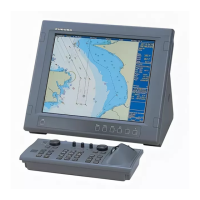13-1
13. Route Planning
13.1 Introduction
A route plan defines the navigation plan from starting point to the final destination. The plan includes:
• Route name
• Name, latitude and longitude of each waypoint
• Radius of turn circle at each waypoint (max. 200 waypoints)
• Safe channel limits
• Chart alert calculation based on channel limits against chart database and user chart danger
• Minimum and maximum speed for each leg
• The navigation method (rhumb line, great circle)
• Fuel saving
• ETD for the first waypoint
• ETA for the last waypoint
• Ship and environmental conditions affecting the ship speed calculation
• Name of the user chart to use during route monitoring together with this planned route
• Name of the Notes to use during route monitoring together with this planned route
Using the above-mentioned data, the system calculates speed, course and length for each leg, ETAs for each
waypoint, fuel consumption and WOP for the Autopilot. It also calculates safe water areas based on operator-
defined channel limits. The calculated data is displayed in tabular form that can be printed as a documented route
plan and also stored in a file for later use. The route files thus formed contain the Autopilot commands for each
waypoint.
The main functions of route planning are:
• Define waypoints
• Define turnings for each waypoint
• Define channel limits for each leg (a leg is the line connected between two waypoints). The channel limits are
used to detect chart alerts when you are planning or monitoring your route.
• Define the speed for each leg
• Calculation for ETD and ETA
• Calculation for most economical sailing
Limitation of displayed route
If you have small-scale chart(s) on display having the whole eastern/western (0-180°E/0-180°W) hemisphere and a
part of the other hemisphere on display, there is a limitation to display a route. To avoid this, set chart center so that
the whole eastern/western hemisphere is not on display.

